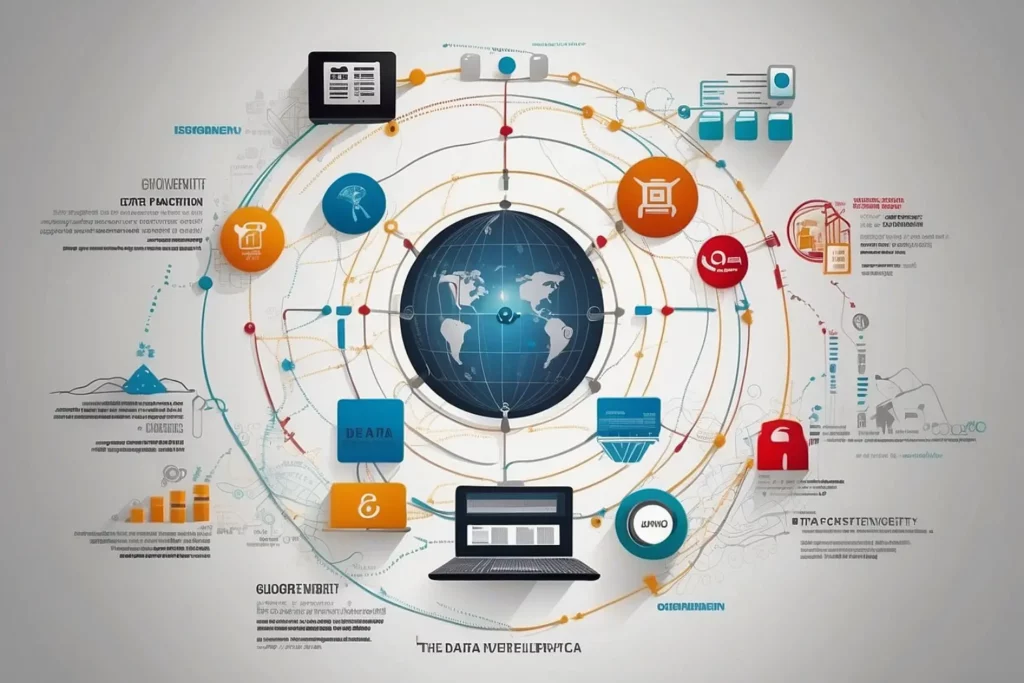
Worried about your online details getting into the wrong hands? A recent study found that 85% want to improve online privacy. Our blog will outline the latest trends and predictions, helping you stay ahead and keep your personal information safe.
Discover what’s next for your digital life!
Key Takeaways
- AI technology is advancing and could lead to new privacy laws, which makes it critical for businesses to keep up-to-date with regulations.
- There’s a push for better protection of children‘s online data, leading to stricter rules about how companies can collect and use this information.
- More people are understanding the importance of data sovereignty, leading them to demand more control over their personal information through centralised privacy management systems.
- The huge amount of unstructured data being produced presents challenges in management and security that need addressing through improved classification methods.
- Utilising AI for privacy risk management is becoming essential as it helps organisations protect consumer data by identifying and mitigating threats quickly.
Increase in Data Breaches and Fines
Generative AI breaches are on the rise, leading to increased fines and penalties for non-compliance. Consumers are also becoming more aware of their privacy rights, putting pressure on companies to prioritise data security.
Generative AI Breaches
Generative AI is transforming the way we interact with technology, but it also poses new risks to data privacy. These intelligent systems can create realistic images, text, and voices that are sometimes indistinguishable from human-generated content.
Unfortunately, this means that personal information could be manipulated or fabricated in ways we’ve never seen before.
Cybercriminals could exploit generative AI to produce sophisticated phishing attacks or deep fakes that trick users into giving away sensitive data. Imagine receiving a video call from your boss asking for classified company details – except it’s not really them; it’s an AI-created impersonation.
As these breaches become more common, staying vigilant about online security has never been so crucial. Users must keep their guard up against these convincing fakes, and businesses need to invest in robust cybersecurity measures to protect both their interests and customer data.
Increased Penalties for Non-Compliance
Companies that fail to comply with data protection regulations will face increased penalties as the landscape of online privacy continues to evolve. User privacy concerns have prompted stricter enforcement measures, and businesses should take heed of these changes.
The growing trend in imposing heavier fines for non-compliance reflects the urgent need for robust data security measures across industries.
As global attitudes shift towards protecting personal data, businesses must adapt to a world where consumer rights are paramount. Organisations can no longer afford to overlook the importance of respecting user privacy and complying with stringent data protection laws.
Consumer Awareness of Privacy

Consumer awareness of privacy is growing rapidly, driven by an increasing number of data breaches and heightened concerns about personal data protection. Research indicates that 85% of global adults express a strong desire to take more proactive measures in safeguarding their online privacy.
With the proliferation of surveillance technology, individuals are becoming more mindful of their digital footprints and the potential risks associated with sharing personal information online.
Consumers are increasingly demanding greater transparency from companies regarding how their data is being used and protected. As user attitudes continue to shift towards prioritising privacy, businesses will need to adapt by implementing robust security measures and adhering to stringent data protection regulations.
In this evolving landscape, it’s crucial for both consumers and organisations to stay informed about the latest trends in online privacy.
Children’s Online Safety
The increasing focus on protecting children’s data online has led to stricter regulations for child data collection. Parents and internet users are becoming more aware of the importance of safeguarding children’s online privacy, leading to potential changes in online privacy laws.
Focus on Protecting Children’s Data
Stricter regulations are being implemented to protect children’s data online. Parents and internet users should be aware of the increased focus on ensuring that children’s personal information is not misused or mishandled.
Data encryption and privacy laws continue to evolve, reflecting global harmonisation efforts and a growing emphasis on digital privacy for minors.
Businesses have a responsibility to comply with these regulations and safeguard children’s data from unauthorised access or use. With 85% of global adults expressing strong concern for online privacy, it is clear that protecting children’s data is an important component of the broader conversation about digital security and regulatory changes in the years ahead.
Stricter Regulations for Child Data Collection
Stricter regulations for child data collection are becoming increasingly important in today’s digital age. Legislation and privacy regulations are catching up to address concerns about children’s online safety, with a focus on protecting their personal information.
Authorities are recognising the need to control and monitor how data is collected from children to ensure their privacy and security.
Parental concern over children’s online safety has prompted a shift towards stricter regulations regarding the collection of child data. The increased penalties for non-compliance highlight the severity of these measures, reinforcing the importance of protecting young users’ personal information.
As technology continues to evolve rapidly, it is essential for parents, office workers, and internet users to stay informed about these changes in order to adapt to the shifting landscape of online privacy.
Explosion of Unstructured Data
As online data continues to grow, the management of unstructured data presents a significant challenge. Data classification is crucial in order to safeguard privacy and security effectively.
Challenges in Managing Unstructured Data
Managing unstructured data presents significant challenges for businesses and individuals alike. With the explosion of data in various forms, such as text, images, and audio files, organising and extracting value from this unstructured information is becoming increasingly complex.
As technology continues to advance at a rapid pace, finding effective ways to classify and make sense of unstructured data will be crucial for maintaining privacy and security. This requires implementing robust data classification systems to ensure that sensitive information is appropriately protected.
Moreover, the sheer volume of unstructured data makes it difficult to track and manage effectively. As a result, businesses must invest in advanced tools and technologies designed specifically for managing unstructured data.
Importance of Data Classification
Data classification plays a crucial role in the protection of sensitive information. It enables organisations to categorise and label data based on its level of sensitivity, ensuring that appropriate security measures are applied.
By classifying data, businesses can effectively manage and safeguard valuable information from potential cyber threats.
The process of data classification also helps companies comply with privacy regulations and standards, such as GDPR and CCPA, by identifying and protecting personal data. Additionally, it allows for more efficient data management, making it easier to locate specific information when needed.

AI and Legislation
AI technology will continue to advance, leading to potential new legislation around AI and privacy. This could have a significant impact on how data is collected, stored, and used in the future.
Continued Proliferation of AI Technology
AI technology continues to expand rapidly, impacting various aspects of online privacy. As AI systems become more sophisticated, they can play a significant role in data protection and privacy risk management.
With the potential for new legislation around AI and privacy on the horizon, businesses must stay informed and adapt to ensure compliance with evolving regulations. Data sovereignty, consumers’ growing awareness of their rights, and the centralised user experience for managing privacy are also influenced by AI advancements.
As 2024 progresses, it is crucial for individuals and organisations to understand the implications of these developments on their online privacy. The explosion of unstructured data poses challenges that can be mitigated through effective data classification technologies empowered by AI.
Potential for New Legislation Around AI and Privacy
As AI technology continues to proliferate, the potential for new legislation around AI and privacy is gaining momentum. With 85% of global adults expressing a strong concern for their online privacy, policymakers are under pressure to address the increasingly complex landscape of data privacy.
The interplay between evolving technologies and consumer expectations is urging governments to consider comprehensive regulations that safeguard personal information in the age of ubiquitous surveillance.

Data Sovereignty and Consumer Empowerment
Growing awareness of data sovereignty will lead to increased demand for centralised privacy user experience for consumers. Utilising AI for privacy risk management will become essential in safeguarding consumer data.
Growing Awareness of Data Sovereignty
More people are becoming aware of the concept of data sovereignty, which refers to the idea that individuals have the right to control their own personal data. This is in response to increasing concerns about online privacy and security.
According to recent statistics, 85% of global adults express a strong concern for privacy in the digital age and are keen on doing more to protect their online privacy. As awareness grows, individuals and organisations are seeking ways to navigate the evolving landscape of data privacy.
Data sovereignty is becoming an important topic for internet users as they seek greater control over their personal information. As businesses continue to collect vast amounts of consumer data, there is a growing demand for clear regulations and user-centric tools that empower individuals to manage their own data.

Centralised Privacy User Experience for Consumers
As we consider the growing awareness of data sovereignty, it is evident that a centralised privacy user experience for consumers is gaining traction. In 2024, global adults are increasingly seeking ways to protect their online privacy, indicating a strong concern for personal data security in the digital age.
The future of online privacy will likely witness advancements focused on simplifying and streamlining the user experience, ensuring that individuals have greater control over their personal information.
With technology evolving at a rapid pace, businesses and organisations will need to stay ahead of the curve by providing intuitive and accessible tools for users to manage their privacy settings effectively.
Utilising AI for Privacy Risk Management
Businesses and organisations are increasingly turning to AI technology to manage privacy risks more effectively. Data breaches have become more sophisticated, leading businesses to adopt AI-powered tools for proactive risk assessment and threat detection.
The use of AI enables swift identification of potential privacy vulnerabilities and helps in taking preventive measures, ensuring better protection of sensitive data from unauthorised access or exploitation.
Furthermore, AI also allows for the automation of compliance processes with evolving data protection regulations. It aids in monitoring user activities, identifying patterns, and enforcing privacy policies efficiently.
By leveraging AI for privacy risk management, companies can stay ahead of emerging threats and maintain a robust security posture that aligns with the expectations of consumers and regulatory requirements.

As online privacy continues to evolve, new technologies and regulations will shape the landscape. Consumers are demanding greater control over their data, driving the need for improved privacy measures.
The future of online privacy is inextricably linked with technological advances and changing attitudes towards data security. As we move forward, it’s essential to remain vigilant and proactive in safeguarding our digital information.
FAQs
What can we predict about the future of online privacy?
In the future, data technology advancements may lead to stronger security measures that protect our personal information from unauthorised access.
Are there new trends in how companies handle our data?
Yes, emerging trends show a shift towards more transparency and control for users over their own data, responding to growing security concerns regarding online privacy.
How will technology impact online privacy in the years ahead?
Technology is likely to both challenge and enhance online privacy through advanced security systems designed to keep user data safe as well as through new tools that could potentially threaten it.
Should we be worried about our online privacy in the future?
It’s important to stay informed and cautious—while technology develops ways to better safeguard your information, being proactive about your own digital footprint is also key for maintaining your online privacy.
